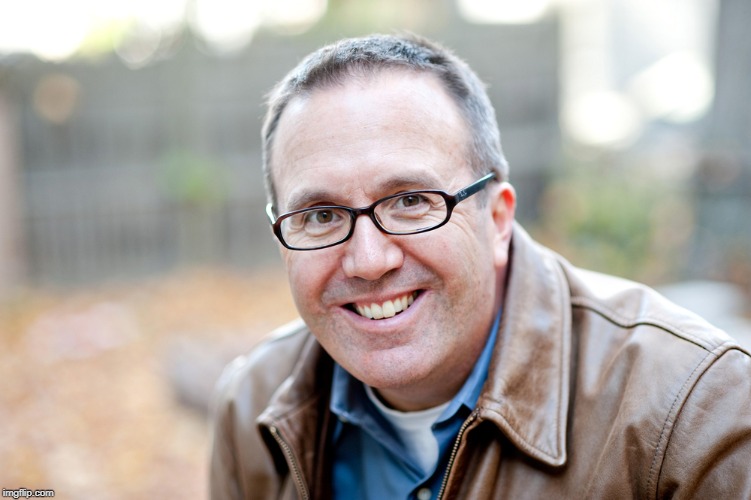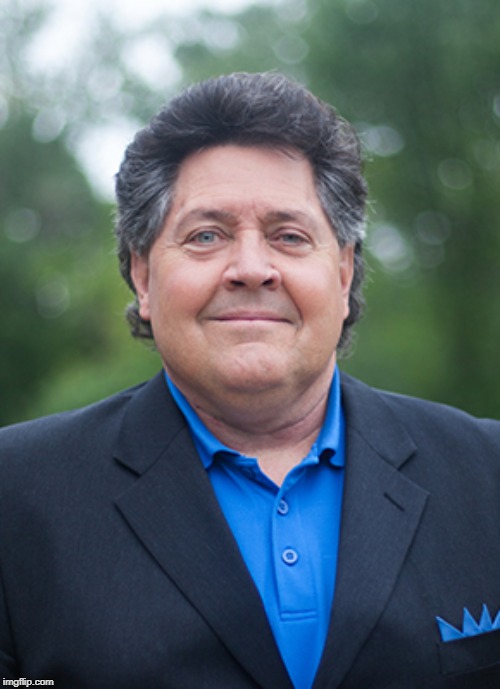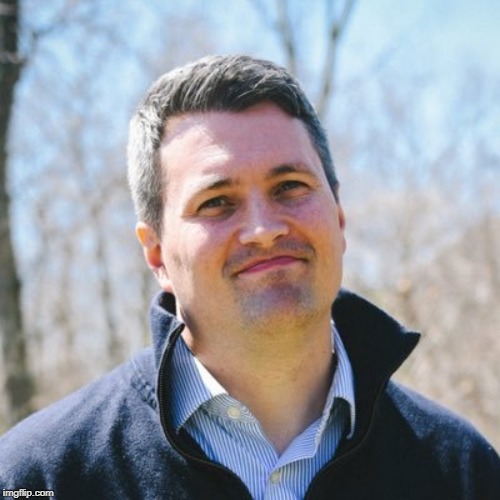You CAN judge a book by its cover. It is necessary, efficient and reasonable to do so. Similarly, you can judge a man by the company he keeps. Daniel Harrell is Christianity Today’s new Editor-In-Chief.

As always, I’m suspicious about the emotional health of those with both baggy eyes and large crows-feet, unless they’re old enough to be wrinkly in general. His teeth seem way too small for his skull… I don’t know what to make of it, but baring the gums when smiling indicates either high ego or eagerness to please. Neither is promising in senior management.
Large upper third of his face indicates intellectual inclination, common in lifetime clergy. Rounded eyebrows for social focus so I wouldn’t have expected him to be a Unix guru.
Several months ago, Christianity Today’s past editor in chief Mark Galli announced his retirement, and Friday was his last day.
He also announced his seething, passive-aggressive hatred for Christianity Today readers who support Trump.
Christianity Today’s new editor in chief is Longtime pastor and writer Daniel Harrell, who most recently served as senior minister of Colonial Church in Edina, Minnesota. Harrell lost his wife Dawn unexpectedly last Easter and the aftermath of this death has been difficult.
“A big part of this next season of my life is devoted to her legacy and her love for words and theology and for Christ and wanting to live that well for her, for my daughter, and for myself,” said Harrell.
That’s a very not-promising indicator of future performance, if he’s so hung up on his wife’s death after 9 months as to offer it for his introductory biographical fact. Eh, I was going to look deeper anyway. Chronicling the collapse of American Christian institutions is a priority for me, as is chronicling how blindingly obvious the red flags tend to be.
http://danielharrell.com/about/
Daniel M. Harrell is Editor-in-Chief of Christianity Today. Formerly, he served ten years as Senior Minister of Colonial Church, Edina, Minnesota, and for 23 years before that as preaching minister at Park Street Church, Boston, Massachusetts. Daniel holds a BA from the University of North Carolina, Chapel Hill (Psychology and Religion), an MDiv from Gordon-Conwell Theological Seminary and his PhD from Boston College (Developmental & Educational Psychology).
That’s a Congregational/Puritan background overall. UNC-Chapel Hill has become notorious for its socialist ideology and intolerance of American history even by the standards of our corrupted education system. Gordon-Conwell is an intentionally nondenominational seminary. I am suspicious of nondenominational churches generally because of accountability issues and that goes double for a seminary… the students aren’t there to scrutinize their professors’ theology, now are they?
I pulled up Colonial Church. Here’s the company that Harrell kept for ten years:
Segue

Jeff Lindsay, Acting Senior Minister. A lopsided face! His personal life is a mess. Thin lips indicate a lack of passion; lip corners are neutral-right, pessimist-left; he’s accustomed to keeping up appearances but without the skill of an actor or sociopath. Large nostrils indicate plenty of social energy so he probably thrives in his current situation.
He got an associate’s in law enforcement before going ministry-track at Bethel. I conjecture that he planned a police career but found his personality too soft for it

Sara Garbers, Acting Senior Associate Minister. Low-res picture. Eyes are recessed for defensiveness. Eyebrows are weird, I won’t opine on them. Her hair’s a bit crazy but maybe she’s old enough for it to have happened naturally. No, that’s such a bad job of hair dyeing that I’ll go with crazy hair.
Her linked bio confirms!
“I am passionate about matters of faith and justice, particularly focused on gender justice and issues of domestic & sexual violence. In addition to my work at the church, I serve the city of St. Louis Park as a human rights commissioner, my school as a sexual assault advocate, and am completing my doctorate in ethics at Loyola University Chicago.”
Sara received her Bachelor of Arts in Communications and Women’s Studies from the University of Minnesota Duluth.
Feminist.
She then completed a Master of Divinity from Bethel Seminary (MN).
Witch.
She is currently a doctoral candidate at Loyola University Chicago. Her dissertation is entitled “Dangerous Memories”: Sexual Violence and Trauma- Towards a Feminist Political Theological Ethics of Memory.
FEMINIST WITCH!

Christian Winn, Interim Teaching Minister. Odd name. Curly hair denotes high sensuality but this is contradicted by passionless thin lips. I suspect vanity.
Dr. Christian T. Collins Winn…
With a bio intro like that, vanity sounds likely.
…is deeply passionate about helping others understand the gospel as it forms them into justice-seeking and mercy-loving people who walk in the world with humility. He completed a PhD in Theological and Religious Studies at Drew University and was Professor of Historical and Systematic Theology at Bethel University from 2005-2018.
Bethel Again.
He has a decorated academic record…
Which is NOT what you want in a teaching minister. You want a front-line veteran, not an Ivory tower egghead.
…and his research interests include the history of Pietism, ecumenism, theology of Karl Barth…
A pastor who hacked off Adolf Hitler under cover of Swiss citizenship. Old news.
political theology…
Good, the American Church can’t afford to ignore politics anymore.
problematics of race…
Uh-oh.
comparative theology, inter-faith dialogue…
False religions are false, “Minister”. Christ is not the equal of Mohammed, Buddha or Che Guevara.
…historiography of evangelicalism, and the theological significance of the Black Radical Tradition.
So, that’s Harrell’s peers.
End segue.
[Harrell] has taught at Gordon-Conwell, Fuller and Bethel seminaries, as well as at Boston University and Harvard University. He served for many years on the Community Ethics Committee of the Harvard University Hospitals and on the Advisory Council of Biologos.
Harvard Community Ethics for many years. No more need be said about his loyalty.
Daniel has written for Christianity Today and The Christian Century, appeared on PBS and regularly blogged for Cultivare at patheos.com. He is widowed (Dawn, 2019) and lives with his lovely daughter in Minneapolis and will be moving to Chicagoland.
Bad sign, that his grown daughter is still living with Daddy.
I used to ask my fellow Christians this ethical question. A church wants to help poor families survive a predicted-to-be-bad winter. They have enough money to help ten families. A bureaucrat hears of their effort and offers them enough taxpayer money to help one hundred poor families, on condition that they not talk about Christ.
What should the church do? Help ten families in the name of God or 100 families in the name of public service?
Guess what, Harrell answered that question… poorly.
Yes, Sometimes We Can Serve Both God and Mammon
by Daniel M. Harrell, 7 October 2013
I’ve always believed that the church exists on earth for the sake of mission—the tangible, embodied love of Christ. It’s the one thing we do on earth that we won’t do in heaven. More than well-done music and a well-honed sermon in a well-crafted building, the church is called to take up concrete things done with and for other people: feeding the hungry. Visiting the sick. Loving neighbors. Speaking truth. Loving enemies. Sharing the gospel.
Fatal error. The Church’s job in mortal life is threefold:
1. Proclaim the Gospel. Great Commission stuff.
2. Worship God.
3. Be the salt of the Earth, actively resisting the spread of evil.
Therefore, it is not acceptable for the Church to care for “society” except as a means of
1. Creating opportunities to proclaim the Gospel, ex. free meal to the homeless if they first listen to a sermon.
2. Worship God. A well-crafted building can sometimes do that better than humans. Europe is almost completely post-Christian yet the cathedrals still speak to God. Which is why the Muslims vandalize them so eagerly.
3. Fighting evil. Which is 180 degrees opposite from Harrell’s “loving enemies”. You love them by forcing them to face the evil they commit, not be seeking Unity with them.
You can do nice things for people if you want but being nice is not a teaching of either Christ or the Apostles.
And by the way, the one thing we Christians do on Earth that we won’t in Heaven is evil, from its beginning of facing temptation to its inevitable conclusion of suffering and death.
Given this, it seems odd that many churches treat mission with nickel-and-dime efforts: a few hundred dollars a year to this agency, another check to that, a short-term trip here and there. Churches outsource much of their mission work to specialized organizations. Though both efficient and expedient, doing this has a way of teaching us to be donors instead of doers.
There are valid reasons missionary work gets outsourced, from language barriers to effective financial oversight. At least, I assume he means “mission” as in “missionary”.
Arriving as the new minister at my church—a fairly affluent, Midwest, middle-aged, suburban church in the Congregational model—I became convinced that God was calling us to something we could we do together that none of us could do alone. Historically speaking, common mission boosts enthusiasm, deepens prayer, builds community, and bears fruit for the kingdom. While no single church can go to all ends of the earth (and should not aspire to), surely ours could marshal its ample resources for a bigger splash than we were making.
Mine was a bad assumption.
Unfortunately, my missions pitch sounded exhausting. Like many a mainline, our congregation has its share of gray hair. This means more wisdom and life experience than the hip churches that older congregations envy.
Okay, Boomer.
But wisdom without energy means that mission goes undone. We needed to integrate a younger demographic into our church. Regrettably, with the so-called “rise of the nones” (the population of adults indicating no religious affiliation), integrating younger people into our church was a challenge. Pop music worship and entertaining children’s programs no longer sufficed.
I give credit for him wanting to do more than cosmetic changes to address the problem of Christians no longer wanting to associate with a church. I then take back the credit because Harrell proceeded to double down.
At the same time, the decline in religiosity among younger people is not necessarily a decline in spirituality. Many young people are certainly religious about justice and social causes. And here was the mission tie: Instead of trying to attract younger people for the purpose of mission, perhaps doing mission on purpose could attract younger people.
He took the globalist ticket and transformed his church into a worldly NGO. Come, Social Justice Warriors! Help us help you!
As fortune came to pass, our church recently sold a piece of land for $2 million. Most of that went to retire a sizable debt and building repairs, but we knew that to spend the entire proceeds on ourselves was unfaithful. We voted to allocate 20 percent to serving outside our walls.
The sensible way to spend the 20 percent would have been to find a successful service agency and write the check. But I hated that idea. Surely we could leverage this money in a way that would let us get personally involved.
Here’s an idea: Commission some artwork. Modern churches are fucking pathetic, the spiritual version of soul-crushing cubicle farms. Wooden boxes that maybe have a cross hanging on a wall somewhere. The National Endowment for the Arts isn’t going to sponsor anything pro-Christian, that’s for damn sure.
Is God worthy of your praise? Then how about you Churchian churches ACT LIKE IT and spend money on what is useless except to glorify God?
Yet how to pick? We assessed. We discussed. We hired consultants. We prayed. The heavens stayed silent.
“I became convinced that God was calling us to hire consultants.” Specifically, Katherine Leary Alsdorf from Redeemer Presbyterian Church’s Center for Faith and Work and Dave Blanchard from Praxis Labs


We had the money. We had the wisdom and experience, especially in fields related to business. What we lacked was our particular calling (or the energy to follow it through). What if we challenged young adults in our church and wider community to generate an idea that could become our calling?
I proposed we take $250,000 and sponsor a social entrepreneurial competition. We could invite innovators ages 35 and younger to submit project proposals with gospel values of grace, justice, love, redemption, and reconciliation. We’d ask that applicants affirm the Apostles’ Creed, because we wanted our effort to promote Christian faith.
A checkbox is not how one tests for Christianity. The applicants’ devotion should have been obvious from their proposals.
Our church would provide funding and expertise, networking, creative community, and acceleration toward successful launches. We’d use business acumen to make the projects sustainable and stress measurable outcomes.
I’ve seen this before. Public-private partnerships. Convergence.
When I pitched the idea of a business-based social entrepreneurial competition to church leaders, some presumed I’d lost my mind. This was too large an amount of cash to risk on unproven ventures. Better to give it to a proven enterprise and maximize our return on investment. To put it in biblical parlance: Be a good steward. Church and business don’t mix. “You can’t serve both God and Mammon,” Jesus said (Luke 16:13).
They had a point. So many foundational business values run counter to the gospel, be it the primacy of shareholders over service, gluttonous profits, avaricious career ambition, or accumulating too much capital. To prosper financially may not be a biblical vice, but greed, injustice, and extravagance lurk in prosperity’s shadows.
On the other hand, Jesus also said, “all things are possible with God” (Matt 19:26).
THAT is Harrell’s excuse for ignoring Christ’s warning about mixing God with Profit? That’s pathetic. Should we care about any of Christ’s warnings or just assume He’ll declare us to be Special Snowflakes?
Mission can redeem the better aspects of the market to serve kingdom ends. Virtues of honesty and hard work, along with love and fairness, all improve the way we do business. To believe in Jesus is to value all these things. Granted, to believe in Jesus is also to embrace humiliation and loss, and loss is no way to profit—unless you buy the gospel. To take a providential windfall and risk it all on untested idealists sounded as ridiculous as changing the world through death on a cross. It takes faith for good business sense to make good mission sense.
What the Hell does “mission” mean? Certainly not “missionary”. I really hope his “buy the Gospel” comment wasn’t him showing his true colors.
Fairness isn’t even a Christian virtue. The last thing any believer should want is for God to deal with him in fairness. We follow Christ in order to NOT get what we deserve. The second commandment is to treat others like ourselves, not to treat others in fairness.
Fairness is government-enforced reparations from taxpayers who’ve never owned a slave to parasites who’ve never been one.
Proof of Convergence coming up:
Being the new minister, I had relational capital to spend. The congregation tentatively went along, walking by faith rather than sight. We named the initiative Innové, a French word meaning “breaking new ground”—or perhaps better, “digging a grave,” in keeping with the gospel’s promise of resurrection power.
“Dig a grave” and “buy the gospel”?
Per https://innovestudios.org/colonial-church-case-study/ “The Innové Project—a social enterprise competition that afforded Colonial the opportunity to connect the wisdom and experience of its Boomers to the vision and energy of local Millennials who wanted to influence the city for good.” OMG I can’t even.
We designed an evaluation process that maximized our business-minded congregation–from technology, marketing, assessment, and coaching to advising, planning, training, budgeting, execution and evaluation. More than 150 members volunteered their talents. We worried that after marshaling this wealth of resources we would fail to attract applicants. But worry has a beautiful way of converting to prayer.
Twenty applications came in as we approached the due date—a disappointing number, frankly. We’d prayed for more. Then, as the clock approached midnight, our online application portal lit up. Apparently young entrepreneurs like to take every minute they are given (either that, or they like to procrastinate). Suddenly our modest 20 applicants bloomed to 139.
The applications ran the gamut from laundro-daycaremats for underemployed mothers in the city, to concierge services for elderly people who wanted to stay in their homes, all the way to educational projects for children orphaned by conflict in Kenya. We scored according to uniqueness, feasibility, and fit with our congregation. We wanted not only to fund and launch new mission endeavors, but to participate in the work itself.
Harrell’s first action in his newly entrepreneurial church was funneling money to the Social Justice agenda.
We also trained 24 gifted church members to be Innové “navigators.” Each of them ushered through the process the semi-finalist projects. Our process entailed formulating business plans and budgets, as well as preparing a pitch for a panel of judges who determined which semi-finalists to fund.
Eventually, after much input and prayer, the semi-finalists submitted their business plans and pitched their ideas to our judges. They picked six to fund as “Protégés” (in keeping with Innové’s French milieu). The Protégés included a church-school partnership program that provides weekend meals to undernourished children, a nonprofit, non-predatory payday lender, a mobile food market that sells affordable fresh fruit and vegetables in urban “food deserts,” an educational initiative for men to combat sex trafficking, a college opportunity for post-secondary students with disabilities, and a for-profit printing business that directs profits toward clean water projects.
How is any of that a legitimate Church function? Did the school allow sermonizing during lunchtime in return for financial assistance? Were the vegans lectured about God eating fish while handed free veggies? I don’t even know where to begin with the concept of “nonprofit payday loans” Your pastor’s day job is loan shark?
You want to offer a college scholarship, pastors? Give the scholarship to a man willing to treat the university campus as a bona fide missionary field a la North Korea. Pay his bills so he can be there, then defend him when, not if, the Progs attack him for talking about Jesus to the lost and blind.
But no, Harrell gave the scholarship to a “disabled” student. How original. From each according to his ability, to each according to his need. That’s Marx, not Christ.
To further ensure project success, the Protégés embarked with us on an incubation period that provided further consulting, financial and professional planning assistance led by church members with strong nonprofit and new business experience. Church office space was also offered as needed.
Methinks Bethel Seminary misnamed its MBA program.
Innové brought together a vast array of gifts that comprised our church—human resources people, arts people, social services people, accountants, lawyers, managers, executives, marketers, technologists, organizational developers, and more. They all were finally getting to use what they did best for the sake of God’s work in the world. It was as good as we’d prayed it would be: good for the gospel, good for our congregation, good for our young entrepreneurs and good for the world. And having done it as unto the Lord meant our work now had an eternal lifetime guarantee.
Harrell turned his church into yet another Progtard nonprofit. If I ever run a church, I will not lift one finger to help the poor because people need to be culture-shocked into realizing that Christianity is not Mammon.
We’re not here to redeem the Earth for Christ. We’re here to become like Christ.
“good for the world?”
I like St Peter’s view on the world and what’s good for it:
II Peter 3:
10 But the day of the Lord will come as a thief in the night; in the which the heavens shall pass away with a great noise, and the elements shall melt with fervent heat, the earth also and the works that are therein shall be burned up.
11 Seeing then that all these things shall be dissolved, what manner of persons ought ye to be in all holy conversation and godliness,
12 Looking for and hasting unto the coming of the day of God, wherein the heavens being on fire shall be dissolved, and the elements shall melt with fervent heat?
the students aren’t there to scrutinize their professors’ theology, now are they?
For most, probably not. I scrutinized however. One “theology” professor questioned whether I thought he was even a Christian. After reflecting on his question, I was not sure.
I also graded the professors and their classes on the extent to which they were based on Scripture, instead of on religious ideas or religious books, and gave that assessment to the Dean. And of course I gave this assessment, because there was so much need for improvement.
Jeff Lindsay, Acting Senior Minister. A lopsided face… Thin lips…
How about the most obvious? He is so fat that you can see it in his face/neck? Titus 1 gives requirements for elders, and self-control is on the list.
I am overweight right now by about 15 extra pounds, but that is a small enough amount that you would not know it from seeing only my face. If a man cannot (wisely) direct himself, how is he supposed to direct the church under his care? 1 Tim 3.
“He is so fat that you can see it in his face/neck?”
That fold of fat that runs ear-to-ear under his chin? I have that myself. It makes me look double-chinned despite being 14% bodyfat. Chinese physiognomy considers it a sign of good luck. (The Chinese consider anything that suggests abundant food to be a sign of good luck, which tells you why Buddha is always fat and most of what you need to know about the Middle Kingdom’s four thousand years of continuous bureaucracy.)
It can be either a sign of obesity or, in my case, that my face shape leaves little room between a weak chin and my throat. A profile shot would confirm/deny but alas, most people don’t take selfies of their ears.
Lindsay does appear to have manboobs so I wouldn’t bet against you.
Huh, you learn something new every day. Thanks for the correction GQ.